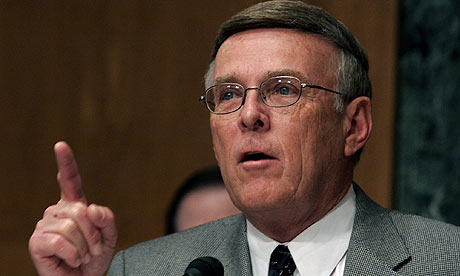Results 1 to 1 of 1
Thread Information
Users Browsing this Thread
There are currently 1 users browsing this thread. (0 members and 1 guests)
-
01-07-2010, 08:51 PM #1Senior Member


- Join Date
- May 2007
- Location
- South West Florida (Behind friendly lines but still in Occupied Territory)
- Posts
- 117,696
Democrats face midterm elections exodus amid fears of backla
Democrats face midterm elections exodus
Democratic senator and governor say they will not seek re-election, and two more set to follow, amid fears of backlash
* Ewen MacAskill in Washington
* guardian.co.uk, Wednesday 6 January 2010 22.25 GMT
* Article history
Byron Dorgan

The North Dakota senator Byron Dorgan said he would not be standing for re-election in November. Photograph: Chip Somodevilla/Getty Images
Democratic fears of a mauling in the next big electoral test in November grew today with a sudden flurry of surprise announcements from party veterans and rising stars that they would not be standing.
Two senators, of which Chris Dodd in Connecticut is the best known, and a governor said they had ditched plans to run again. Another abandoned a campaign in the mid-West.
Earlier this week, Dodd had said he would run again. He acknowledged his low polling rates but denied this was why he was leaving.
"In the long sweep of American history there are moments for each elected public official to step aside and let someone else step up. This is my moment to step aside," he said.
All 435 House of Representative seats are up for grabs, and a third of the 100-member Senate, as well as 37 governorships.
The Democrats are almost certain to lose the 60-40 majority they enjoy at present in the Senate â the minimum needed to override Republican blocking tactics â which will make it difficult for Barack Obama to fulfil promises on climate change, immigration and other contentious legislation. His health bill is expected to pass later this month.
After two successful elections, the Democrats appear to have reached their high point, with control of the White House, the House and Senate. The biggest blow to the Democrats was the decision by Byron Dorgan, the senator for North Dakota, not to seek re-election after 30 years, virtually handing the seat to the Republicans.
Dorgan insisted he was standing down not because of fears he would lose in November, but because he wanted to pursue other interests.
The Republican party chairman, Michael Steele, said Dorgan's decision "highlights just how vulnerable both Senate and House Democrats have become since deciding to walk in lockstep with president Obama's government-run policies".
Dodd, 65, who has represented Connecticut in the Senate since 1981, is more of a household name than Dorgan, but his departure will be less of a blow to the Democrats.
Dodd insisted he was leaving for a mixture of reasons that included the passage of the health bill through the Senate last month, which he described as the high point of his 38 years in office.
Polls suggested he was unlikely to hold what is normally a solid Democratic state. But much of the hostility was personal and his successor stands a good chance of holding the Senate seat for the Democrats.
Dodd's drop in popularity followed a decision to move his family from Connecticut to Iowa as part of a failed run for Democratic presidential nomination in 2008. He did badly in the Iowa caucus and soon after dropped out of contention.
More worrying for the Democrats is the decision of the Colorado governor, Bill Ritter, not to seek a second term, a recognition that the party's chances of holding the state have slipped badly.
Another setback came with the decision by John Cherry to abandon his campaign for governorship of Michigan.
Larry Sabato, professor of politics at the University of Virginia, said a momentum was building up against the Democrats: "This is going to be a bad year for them." He added that the announced departures "has induced to some degree a sense of panic in Democratic ranks".
As well as a tough Senate race in North Dakota, the Democrats face serious challenges elsewhere, including the Nevada seat of the party's Senate leader Harry Reid.
Polls show unhappiness with the Democrats over their handling of the economy, in particular the high levels of unemployment. Ominous for the Democrats is that a revival in Republican fortunes comes at a time when there is disarray in that party's own ranks, still battling over whether to shift to the right or the centre.
Even with a 60-seat majority, Obama has struggled to get his healthcare reform bill passed. Two of the 60 include independents who have sought major changes to the bill in return for their support.
Sabato said: "It is not good for Obama. That is why he has pushed so hard. He will never have it so good again. He has got a lot passed but obviously that pace will slow."
⢠This article was amended on 7 January 2009. In the original, the North Dakota senator was named as Bryan Dorgan. This has been corrected.
http://www.guardian.co.uk/world/2010/ja ... tion-obamaJoin our efforts to Secure America's Borders and End Illegal Immigration by Joining ALIPAC's E-Mail Alerts network (CLICK HERE)


 LinkBack URL
LinkBack URL About LinkBacks
About LinkBacks




 Reply With Quote
Reply With Quote

Oklahoma House passes bill making illegal immigration a state...
04-19-2024, 05:14 AM in illegal immigration News Stories & Reports